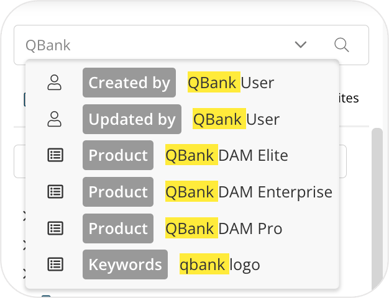Guide: How to search in QBank
The QBank search function is very powerful, you can search on everything connected to the stored assets in QBank.
The search bar
In the search bar, you can enter any value and search through the currently active content (library, uploaded or trash). It is the easiest way of finding media that you are looking for.

Start typing in the search field and QBank will automatically suggest fields that may contain the value you are searching for. Use the arrow keys on the keyboard to navigate through the list of suggestions, and hit "enter" to lock in a specific search criteria. The search result will immediately reload with the new filter, while you can continue to add more.
When you enter a numerical value, you will get additional filter suggestions, such as ID, width/height, file size, etc.

If you want to free text search, use "enter" to lock in your search value without selecting a filter from the suggestions list.
As you're "locking in" search values, the search filters are updated accordingly. Use the filters when you need to fine tune your search, or add criteria that aren't being suggested through the search bar. Read more in "Working with filters".
Freetext searching
QBank implements a powerful free text search engine that breaks down the search words you enter to search for their basic grammar forms. For example, searching for "cars" will still match media tagged with "car", and of course the other way around.
The free text search implements the standard search operators; "AND/OR/NOT", plus searching for words starting with a given value, and searching for a specific phrase.
Let's say we have an image tagged with the description "Autumn image predicting the arrival of winter". The table below describes some different ways you could search for this image. bold text indicates a search term that wouldn't match our example, while the italic does match.
| Operator | Search query | Comments |
|---|---|---|
| AND / & |
autumn and summer predict & arrived |
You can use any version of (and/AND/&) to specify that all of the given words must be matched. You may specify any number of words in your criteria. "predict & arrived" matches because, as we mentioned, the search engine will break down words to their basic grammar forms before searching. |
| OR / | |
autumn or summer |
You can write "or", or use the pipe character "|" to specify that results may match one of the given criteria. Any number of words may be specified. |
| NOT / ! |
!autumn |
Putting an exclamation mark or writing "not" before the search word will exclude any matches that contain that word. NB! If you combine the NOT with another search criteria, you need to use following format: vehicles AND NOT cars |
| <starts with>% |
autu |
The freetext search assumes that it's working with complete words in order to maximize its grammar form & similarity searching potential. If you want to search for words starting with something, use the percent sign after specifying the starting characters. You can currently not freetext search for words containing or ending with something! Use filter searching with the "contains" operator in those situations. Read more about filters here. |
| "<phrase search>" |
"autumn winter" |
Use quotation marks around one or more words to specify a search phrase that must be matched in same order as entered. |
You can create advanced freetext searches by combining different criteria, along with using parentheses to specify conditions that are evaluated separately. Let's say we have another image in addition to the example above. This image has the description "Spring comes before summer".
| Search query | Interpretation by QBank | Comment |
|---|---|---|
| autumn and !summer and !spring | 'autumn' but neither 'summer' nor 'spring' | Simple and common combination of AND and NOT criteria. |
| autumn and winter or spring | 'autumn' and 'winter', or 'spring' | This search would match both of our example images. Even though the second example does not contain "autumn" or "winter". Without parentheses, this query is interpreted quite loosely by QBank and may not yield the results you were expecting. |
| autumn and (winter or spring) | 'autumn' and at least one of 'winter/spring' | By using parentheses around a part of our search statement, we can make sure that QBank understands which parts of the query are most important to us. This query would only match the first image, instead of the example above. |
| "before summer" or "autumn image" | 'before summer' or 'autumn image' must occur in order | Phrase searches may also be combined using AND/OR |
